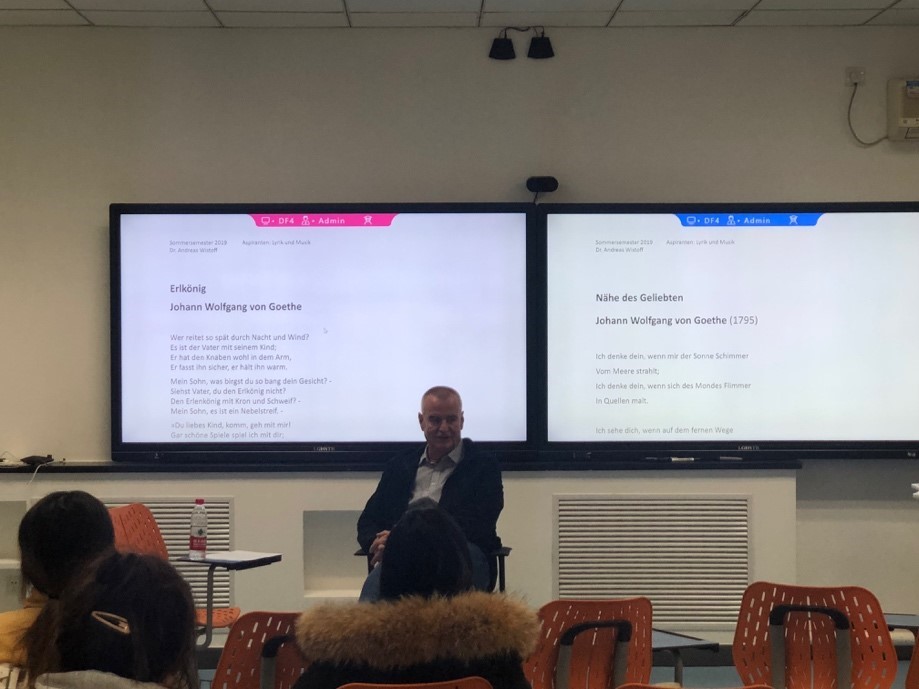The 23rd of the Program for Exchange and Cooperation with Overseas Experts of the D.O.G

The 23rd event for the exchange and cooperation project with overseas experts of the German Department of the SFS was held from 3:30 p.m. to 5:30 p.m. on November 21, 2019 (Thursday). The speaker was Dr. Andreas Wistoff, associate Prof. from the Department of German, Renmin University of China. He took Der Augenblick der Wahrheit (“The Moment of Truth”) as the theme to bring students a unique teaching class.

At the beginning of the lecture, Teacher Liu Dongyao introduced Mr. Wistoff to the studentsin room 108 (Smart Classroom)108 Smart Classroom. Mr. Wistoff held several positions. He is the dean of TestDaF Institute in China, the initiator and chairman of the judges of Nationaler Debattierwettbewerb für chinesische Germanistikstudierende, the school commissioner of the German Embassy in Beijing, and associate professor of the German Department of Renmin University of China. He obtained a PhD degree in German language and literature from the University of Bonn, Germany in 1991, and worked there from 1992 to 2002. From 2001 to 2005, he worked at the German Embassy School in Beijing; From 2005 to present,heworked as a foreign expert, associate professor and master tutor at Renmin University of China. He authored seven books, published more than dozens of papers, and delivered lectures in Asian and European countries.
Focusing on the theme of this lecture, Mr. Wistoff specially selected two poems of Goethe which were of great representativeness, Ich denke dein (I miss You......) and Erlkoenig (The Demon), and combined Franz Schubert’s lieders based on these two poems, aiming at exploring the similarities, differences and cooperation between music and literature in presenting artistic themes. He first introduced the background of the phenomenon of composing music for a poem in the eighteenth century, when the German romanticism and classicism went hand in hand, and writers and composers emerged in large numbers. With the establishment of institutions such as libraries, reading became more convenient for citizens, and people’s acceptance of literature expanded. In addition, women’s education focused on singing and playing instruments, with piano being the most popular. This also gave a further impetus to poetry composing music and achieved the effect of cultural popularization.
After the explanation of the background of the times, Mr. Wistoff used vivid examples to explain the differences in understanding caused by different languages, and compared how people thinkand express between the East and the West. He then interacted and exchanged cordially with the students about music, a language unique to human beings, its thoughts that were difficult to express and what kind of power it had as a symbol. He also talked about the unique language system of music and the connection between languages and music.
Giving a comprehensive and detailed account of the background, Mr. Wistoff recited Goethe’s poems and played Schubert’s music. He first explained the two poems in detail to the students, so that everyone had a grasp of the main theme of the poem. He also played the song composed by Schubert for the poem, thus the students had a different kind of artistic experience by the combination of text and music. During the period, everyone learned about the key points of poetry analysis, Goethe’s anecdotes during his creation, and his interesting attitude towards Schubert’s composition. The lecture came to an end with the enthusiastic questions of the students and the detailed answers from Mr. Wistoff.
Through this lecture, the students learned about the background of German classicism and romanticism and the literary phenomena generated in that era. At the same time, they learned about the relationship between music and languages, and developed a new understanding of the effects brought by the combination, while the two alone cannot produce. More importantly, the enlightened and in-depth lecture aroused everyone’s enthusiasm for learning, and promoted the enthusiasm of teachers and students of the German department to further discuss this topic in the future.
